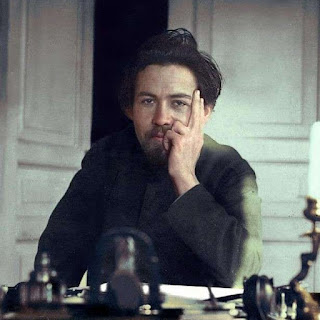The Unparalleled Anton Chekhov
I
was introduced to Chekhov during my college days. For obvious reasons, this
author was part of the syllabus. Before approaching Chekhov, I was introduced
to "Russian Formalism", a school of literary criticism in Russia.
Russian Formalism and its literary scholars never excited me. Hence, my initial
reaction to Chekhov was somewhat similar. I could hardly deal with and understand
the works of Viktor Shklovsky, Yuri Tynianov, Vladimir Propp, and others (all
highly influential Russian and Soviet scholars). Therefore, my initial decision
was to skip reading Chekhov. I had decided already, no more Russian literary
giants! Thankfully that decision was revoked when my end-term exams approached.
I had no choice but to read!
And
that was it! Once you are in Chekhov, there is no coming back. Until that
time, I was judging a "book by its cover", and just for the sake of
examination, I decided to take up another Russian literary scholar. But who
would've known that Chekhov's stories still sprinkle magic upon me whenever I
come across his works.
“The
Cherry Orchard” which happens to be the last play by Chekhov, was my first
read.
Anton Chekhov's works cover a broad spectrum of human emotion and spirit, often described as ambiguous, lyrical, bizarre, humorous, and even haunting. A Chekhovian short story or play points to — but refuses to open — the cupboard where the skeleton is concealed; rather, secrets are slowly revealed. Chekhov’s contributions to the Russian literary canon, and subsequent translations, include stories and plays that are told and retold. Chekhov's works span both time and place by raising thought-provoking questions through his complex characters as they labour through their life situations.
Chekhov
began writing short stories during his days as a medical student at the
University of Moscow. After graduating in 1884 with a degree in medicine, he
began to freelance as a journalist and writer of comic sketches. Early in his
career, he mastered the form of the one-act and produced several masterpieces
of this genre.
Ivanov
(1887), Chekhov's first full-length play, a fairly immature work compared to
his later plays, examines the suicide of a young man very similar to Chekhov
himself in many ways. His next play, The Wood Demon (1888) was also fairly
unsuccessful. In fact, it was not until the Moscow Art Theater production of
The Seagull (1897) that Chekhov enjoyed his first overwhelming success.
In
1899, Chekhov gave the Moscow Art Theatre a revised version of The Wood Demon,
now titled Uncle Vanya (1899). Along with The Three Sisters (1901) and The
Cherry Orchard (1904), this play would go on to become one of the masterpieces
of modern theatre. However, although the Moscow Art Theatre productions
brought Chekhov great fame, he was never quite happy with the style that
director Constantin Stanislavsky imposed on the plays. While Chekhov insisted
that his plays were comedies, Stanislavsky's productions tended to emphasize
their tragic elements. Still, despite their stylistic disagreements, it was
not an unhappy marriage, and these productions brought widespread acclaim to
both Chekhov's work and the Moscow Art Theatre itself.
Chekhov
considered his mature plays to be a kind of comic satire, pointing out the
unhappy nature of existence in turn-of-the-century Russia. Perhaps Chekhov's
style was described best by the poet himself when he wrote:
“All
I wanted was to say honestly to people: 'Have a look at yourselves and see how
bad and dreary your lives are!' The important thing is that people should
realize that, for when they do, they will most certainly create another and
better life for themselves. I will not live to see it, but I know that it will
be quite different, quite unlike our present life. And so long as this
different life does not exist, I shall go on saying to people again and again:
'Please, understand that your life is bad and dreary!”.
Chekhov
successfully performed dual careers of writing and practicing medicine during a
short but productive life. Many biographers overlook Dr Chekhov's role,
although his medical training and practice flowed over into his writing,
influencing both his subject matter and his style. His stories and plays reveal
the insights that Dr Chekhov discovered about the human psyche at work, thus
delving into psychosomatic medicine nearly 50 years before its time. Despite
orders to stop practicing medicine because of his own deteriorating health,
Chekhov devoted himself further to the study of medicine, publishing a landmark
study in social medicine that advocated reform of the Russian penal system.
Meanwhile, his fictional works earned him the coveted Pushkin prize for the
best literary work of the year in 1888. Shortly after celebrating his third
wedding anniversary to actress Olga Knipper, Anton Chekhov died at age 44,
victim of a nearly lifelong battle with tuberculosis.




Comments
Post a Comment